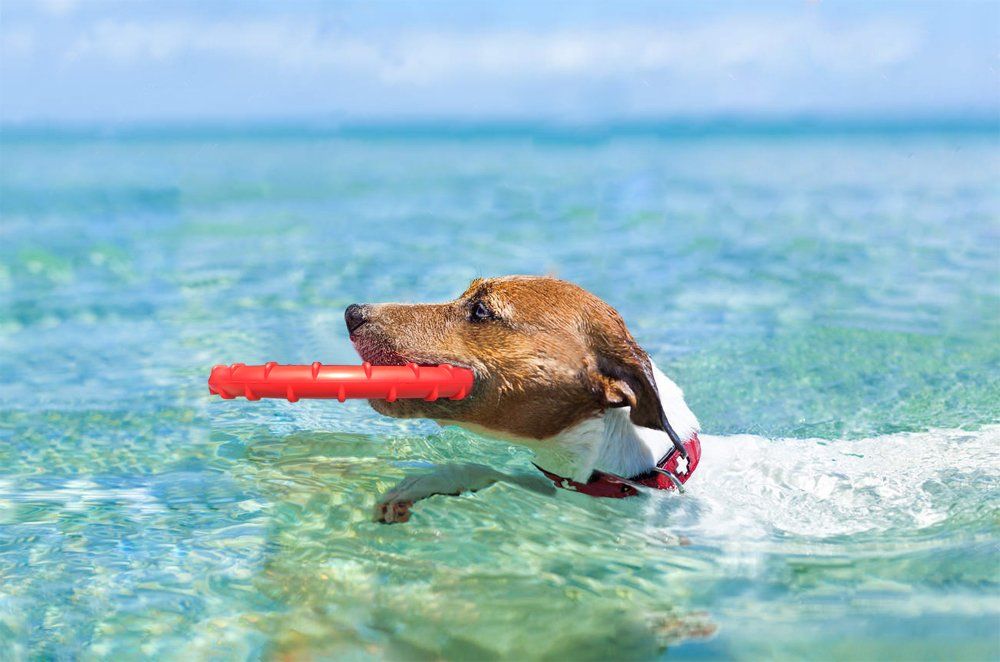Laurie's Blogs.
Jul 2020
Water Intoxication

Do you run an underwater treadmill or a pool in your practice? Do your clients participate in dock diving or water training? Does your canine patient spend excessive amounts of time diving into water sources to retrieve? If so, then you (and your clients) need to understand the potential for water intoxication.
What happens when a dog ingests too much water while playing or working in an aquatic setting? Overconsumption of water can cause an electrolyte imbalance (hyponatremia), thinning of blood plasma, and could even lead to swelling of the brain, liver and kidneys. The intracranial pressure increase can ultimately result in respiratory and cardiac arrest.
You can find papers going back as far as the 1920’s and 1930’s on the subject. Back then they purposely created water intoxication scenarios in animal patients in order to see the resultant responses!
What should you look for in identifying water intoxication? Symptoms of water intoxication in dogs include lack of coordination, lethargy, nausea, bloating, vomiting, dilated pupils, glazed eyes, light gum color, elevated heart rate, and excessive salivation. Advanced symptoms include difficulty breathing, collapsing, loss of consciousness, and seizures.
And what should you do if you suspect water intoxication? In any case, it’s a medical emergency. Veterinary care will involve blood work to confirm the suspicion, and electrolytes are reintroduced to the system. Sometimes a diuretic is used.
The best way to deal with water intoxication however, is to prevent it in the first place. In a practice setting, watch how much and how the animal is retrieving while in the water. This should be controllable in a rehab or hydrotherapy setting. If the dog is voracious about fetching the toy in the water, then see if you can encourage just holding the toy. Alternately, take several breaks from retrieving in the water so at to discourage the potential for too much water consumption. As a side note, owners should also be aware that this is a potential for dogs that like to play with lawn sprinklers or hoses as well.
Things to be aware of and to pass on to your clients!
References:
- Vlajkovic S, Zwetnow NN, Thuomas KA, Bergström K, Pontén U, Nilsson P. Magnetic resonance imaging of water intoxication. An experimental study in dogs. Acta Radiol Suppl. 1986;369:353-355.
- Lou, Joanna. The Dangers of Water Intoxication. Swimming dogs are at risk of ingesting too much water. https://thebark.com/content/danger-water-intoxication?fbclid=IwAR2y2cwfCO-Crkn98FMOZKwubzScZELlJC1kYzPsuYXVw0TcnrE4-69hSgg May 2012. Updated May 2020. Accessed June 29, 2020.
- Smyth FS, Deamer WC, Phatak NM. STUDIES IN SO-CALLED WATER INTOXICATION. J Clin Invest. 1933;12(1):55-65. doi:10.1172/JCI100494
- Levinson, Melvin E. "Water intoxication in congenital megacolon." American Journal of Digestive Diseases 21.6 (1954): 149-150.
- Becker, K. Water Intoxication: Too Much of a Good Thing. https://healthypets.mercola.com/sites/healthypets/archive/2013/10/28/water-intoxification.aspx October 28, 2013. Accessed June 29, 2020.


